- Home
- Jeremy Robinson
Pulse Page 12
Pulse Read online
Page 12
Somehow, coming from Bishop, the words rang true. They would find Pierce, of that King had no doubt. But whether or not they’d be bringing him home in a body bag, well, that was another issue.
19
Tristan da Cunha
Pierce stood in front of a five-foot-square window, staring out at an endless expanse of ocean. He knew they were on an island, but where in the world, he had no idea. His third-story room provided him with a view of the airstrip they’d landed on, a patch of grass beyond, and then one hundred eighty degrees of ocean. He had yet to see any indigenous animals or birds that might hint at a location, and the only flora he’d seen was the grass, which helped about as much as a toothpick in a knife fight.
The room was an improvement over his cell on the plane. Not only was the window larger and view less unnerving, but the accommodations were comfortable—probably meant for actual employees, not prisoners. A firm twin bed sat in the corner across from a desk holding copies of the Odyssey, Dante’s Inferno, and several Edgar Rice Burroughs novels, including Pierce’s favorite, The Lost World. As a child it was the kind of swashbuckling adventure he pictured him and King having as archaeologists. Thanks to Indiana Jones, most men his age had the same views of the science. The truth was far more boring, though no less interesting. Of course, he had been kidnapped by armed looters. That had to count for something. He just wasn’t whipping his way to freedom.
As the first thoughts of dramatic escape filled Pierce’s imagination a sharp knock rattled the door. The guard, Reinhart, who he’d learned was head of Manifold’s security force, opened the door without waiting for an answer and tossed a lab coat to him.
“There’s a problem with your artifact,” he said.
Your artifact. “What wrong with it?”
“Do I look like a pencil-pushing scientist to you?” Reinhart crossed his arms, letting his muscles bulge.
Pierce slipped the lab coat on, noting a Manifold I.D. card with his name and photo on it had been clipped to the breast pocket. Pierce smirked. “Am I hired?”
“Consider this your ninety-day trial period,” Reinhart said.
Pierce fell silent as he moved toward the door. He knew what happened at the end of ninety-day trial periods. You were either kept on board with a hearty handshake...or terminated. As he noticed the strange three-barreled handgun holstered on Reinhart’s hip he realized that he was probably one of the men who kidnapped him, and after ninety days, if he even made it that long, would be his executioner. He fell in step, walking in Reinhart’s massive shadow as they worked their way through a maze of unlabeled hallways.
After nearly two minutes spent in silence, Reinhart pushed through a set of double doors and revealed a futuristic, stark white chamber. Men and women wearing lab coats worked at stations around the five-thousand-square-foot laboratory. Ridley and Maddox turned at their entrance. Maddox approached with a smile. “Welcome to Wonderland, Dr. Pierce.”
“This is, ah, something,” Pierce said.
“It’s more than something,” Maddox said, leading Pierce through the room, pointing out machines and equipment as he walked. “We have fifty Zeiss and Olympus microscopes, one at each station, along with fifty automated karyotyping and FISH—fluorescence in-situ hybridization—stations. Each has the capability for multicolored FISH and other molecular cytogenetic procedures. There are ten low-temperature freezers—the long white boxes by the back wall. The giant pills up there,” he said, pointing to a line of cylindrical bath tub-sized containers bolted to the wall above several workstations, “those are twenty-one liquid nitrogen storage tanks.”
“Isn’t that dangerous? Keeping liquid nitrogen above the workstations.”
“The only way to breach them is with high-caliber bullets or explosives, and if either are used to burst one of those high-pressure containers it won’t matter if they’re on the ceiling or the floor.”
As they approached the long work table Ridley stood by, Maddox continued his tour. “There are five Barocyclers—really high tech—six automated Vysis VP2000 slide processors, three Axon Scanners, four Thermotrons, and—”
“You do realize I’m an archaeologist,” Pierce said. “You’re speaking Chinese to me.”
Maddox paused, frowned, and then covered the remaining distance to the table in silence. Pierce watched the man, wondering how someone with obvious accomplishments could so easily be offended. His impeccably shiny shoes, hair, and teeth all pointed toward some innate desire to impress those around him.
“You’ve gone and hurt his feelings,” Reinhart whispered.
When they stopped at the table, Pierce saw the Hydra artifact resting at its center, still wrapped in the petrified fabric that fused to the head long ago. Pierce starred at it. Part of him thought he’d never see it again. He’d even started thinking that he’d imagined the serpentine details, that his imagination had got the better of him. But seeing it again now, in the bright white glow of the lab, his doubts vanished. This was the real deal. An aberration at the top of the artifact caught his attention. A hole. “You drilled a hole in it?”
“For a core sample,” Maddox said. His voice raised an octave in annoyance. “But it’s the same cementlike substance all the way through. We dissolved it in an alcohol solution, but it just turned to paste. How are we supposed to get a DNA sample from paste?”
“I never claimed that you could.”
“You claimed it was the authentic head of Hy—”
“If you’re trying to pin incompetence on someone else, find another scapegoat.”
Maddox’s face beamed red. Ridley put a hand on his arm, calming the man.
“Dr. Pierce, please,” Ridley said. “He’s under a great deal of pressure to succeed. Now, we can banter about this, call names and so forth, or we can cut right to the swift. What say you?”
“By all means,” Pierce said.
“Being the closest thing to an expert on the Hydra, you will tell us how we can take a DNA sample from what I’ve been told, based on your initial assessment, is the authentic head of the mythical Hydra...or, Mr. Reinhart can take you to the cliff side, put three bullets in the back of your head, and toss you into the Atlantic.” He smiled. “Is that clear enough?”
Pierce tensed from head to toe. He knew a braver man might tell Ridley to shove it, but he really just wanted to survive. He looked up at Maddox and was surprised to see a look of horror on his face. Apparently the man had no idea his employer could be so ruthless. Pierce glanced around the room. The other scientists remained hard at work, having not overheard the conversation. Pierce wondered how many of them knew what was really going on here.
“Well?” Ridley said.
Pierce looked at a long line of tools laid out next to the Hydra head. With a shaky hand he picked up a scalpel. Pushing hard, he cut into the petrified fabric. With a pair of tweezers he pulled the piece away and placed it on the counter. The four-inch square showed what looked like scales, though they were powdery and gray. He watched it for any change.
Nothing.
“You keep the air in here dry,” he said. He had felt the sting of dry air on his throat upon entering the lab and heard the hum of the air conditioners. Most labs kept the air cold and dry to preserve artifacts or other elements, but in the case of Hydra, it kept another reaction from occurring. At least that’s what he hoped. The petrified fabric probably kept natural moisture in the air from reaching the Hydra head en route to this facility, but the air in the lab was like the desert at night. Moisture had yet to reach the sample.
He placed a chisel against the exposed area, he held a hammer high and took a deep breath. He let out a long sigh, thinking, I can’t believe I’m doing this. Then his thoughts turned to what being shot in the back of the head would feel like and he brought the hammer down hard.
A chunk the size of a walnut shot off and fell to the table. He caught it and held it up. It looked no different from a dry piece of dog crap—insignificant in every way. He looked up and f
ound Ridley, Maddox, and Reinhart watching in rapt silence. In fact, the whole lab had gone silent at the sound of hammer and chisel. All eyes were on Pierce.
He stood, picking up a plastic sample dish, and filled it with water from a nearby sink. He returned with the inch-deep water dish and placed it on the counter. He held the Hydra sample in his hand. “Hydra lived in a swamp. The word ‘hydra’ means water. Hercules buried the head in the driest environment on earth.” He looked at Maddox, “Alcohol is a diuretic. It does the same thing to cells as it does to the human body—dehydrates.”
Ridley smiled.
Pierce dropped the sample into the water. It bubbled like an antacid as air trapped in the miniscule depressions was forced out by the water seeping in. As the water cleared, the sample went from light gray to dark, like water on cement. For a moment, Pierce thought he was mistaken and his life was over, but a twitch of movement caught his eye. The sample bounced like a Mexican jumping bean, twice clearing the water. All at once it seemed to ooze and expand, the top side turning vibrant green, the underside red, fleshy sinews. The water inside the container seeped into every pore of the sample until not a drop remained. The fist-sized chunk looked like a green-scaled filet mignon.
“I’ll be damned,” Reinhart said.
Ridley pounded the table victoriously. “Well done.”
Reaching out slowly, Pierce traced his fingers along the scaly flesh. The scales felt hard, almost sharp. Touching it brought it all home and erased his concerns for his own well-being. He smiled wide, picked up the sample container, and handed it to Maddox, whose hands were shaking, too. “Dr. Maddox, your DNA sample.”
20
Pope Air Force Base
As King looked at the laptop screen, sifting through the information taken from Manifold’s turncoat techie, he tuned out the repeating metal on metal clink and stream of curses following them. With a half hour to kill and their gear safely stowed on board the Crescent—Delta’s very own stealth transport—the team gathered at their usual pre-mission spot next to the Delta hangar bay. Two metal poles, each protruding from a square sand pit, forty feet apart, marked the official Delta horseshoe court.
King sat in one of three lawn chairs, in the shade provided by the massive hangar.
The metallic clink of a horseshoe striking a pole sounded out.
“Damn you,” Rook shouted. “Another ringer.”
“That’s game, right?” Knight asked as he walked the forty feet between the two sand pits. Despite being the shortest and lightest of the Chess Team men, he was also one of the most skilled and deadly of the group, especially from a distance. He liked to say he was only good at three things: being a sniper, horseshoes, and women, but he was one of those people who seemed to be good at everything he tried. So when he walked with his short-legged confident stride and flashed his charming, squinty-eyed smile, no one complained...much. Rook sometimes took issue with the pint-sized, dapper-dressed Romeo, as the two were polar opposites, but their tiffs usually ended with laughter.
Bishop, terrible at horseshoes, was almost always paired with Knight, to keep the team game fair. But Rook and Queen weren’t much better and the outcome was almost always predictable. If the game wasn’t intended merely as a way to unwind before a mission, Rook’s blood pressure would skyrocket. Being the front-runner in the race for the world’s worst sore loser benefited the team on the battlefield. He never surrendered. But there was no such thing as a friendly game of Monopoly with Rook.
“I’m out for now,” Queen said, as she plopped into the chair next to King while Bishop stood watch and Rook and Knight started a fresh one-on-one match. She quickly tied her hair back, looping the blond waves into a tightly wound bun. The early summer North Carolina heat, combined with the black fatigues the team wore, had her sweating, even in the shade. After splashing water from her drinking bottle onto her face, she peeked at King’s laptop. “Find anything interesting?”
He just stared at the screen, chewing his lower lip.
She placed her hand on his. “Hey.”
King looked up. He hadn’t seen her approach or heard her talk. “Sorry. What?”
“What are you looking for?”
“Answers.”
“You’re wondering why they took your friend. Why they took his artifact.”
“It just doesn’t make sense,” King said. “Why would Manifold be interested enough in an artifact to kill dozens of people and then destroy a multimillion-dollar research facility to cover their tracks? What could George have to do with all this?”
“How well do you know him?”
King shot a Queen a look.
“Don’t give me that look. The path to truth isn’t always comfortable.” She gave him a shove. “You know that better than anyone.”
“The man is terminally trustworthy, honest, and forgiving...and I was going to let him marry my sister.” He looked her in the eyes. “You already know how that turned out.”
Queen nodded. They all knew about Julie’s death. An air force training flight. She never saw combat, but served with distinction. As King’s early inspiration for joining the military, they all knew her story. He kept a photo of her on him at all times. “He’s family. A brother.”
“Then he’s our brother,” she said.
King smiled and nodded. “But I still don’t know why they wanted him.”
“What was he working on?”
“It was a U.N. dig. Not even his project. He was brought on as a specialist.” King brought up photos of the Nazca dig site and the nine-headed geoglyph. “He said this image represented the Hydra.”
“Like the mythical Hydra? Hercules and all that?”
“That’s the one. You know it?”
“When I learned Greek for Delta I took Greek history and mythology, too.”
“Then you’re going to love this. Beneath the central head, here”—King pointed to the large stone head at the center of the geoglyph—“George found something, a head. Reptilian. But it was just an old statue. Felt like cement. Nothing worth killing for.” He looked Queen in the eyes. “So why would a multibillion-dollar genetics company go to all that trouble for a stone?”
“If it wasn’t a stone.”
King squinted at her.
“The Hydra myth says that Hercules buried the cauterized Hydra head beneath a stone. It doesn’t take much of a leap to assume he’d pick a really dry place as the Hydra lived in—thrived in—water. It made its home in a swamp. It’s really not all that unreasonable. Salamanders regenerate limbs like the Hydra was supposed to. Some salamanders grow up to six feet in length. That’s today. Twenty-five hundred years ago, animals grew a lot bigger. They hadn’t been hunted to extinction and their habitats were still intact. So maybe it was simply an oversized salamander with the disposition of a komodo dragon. Who knows? The real point is: Did George think it was important?”
He thought for a moment. “Yeah.”
“Then forget the salamander and assume it was the real deal. Manifold obviously is, too. The ancients certainly did. The ancient Greek scholar Apollodorus wrote a text titled Library. In it he recorded all of Greek history, from the fall of Troy to roughly one hundred nine B.C.
The golden fleece, the Argonauts, the Iliad, Ulysses, they’re all in there. Here, I’ll show you.”
She took King’s laptop, placed it on her lap, and opened the Firefox Web browser, which connected to the Internet through the airfield’s wireless network. Within thirty seconds she had what she was looking for. She handed the laptop back to King. “This is a translation of the original Greek version of the Library. I highlighted the portion on Hydra.”
King read through the text.
[2.5.2] As a second labour he ordered him to kill the Lernaean hydra.105That creature, bred in the swamp of Lerna, used to go forth into the plain and ravage both the cattle and the country. Now the hydra had a huge body, with nine heads, eight mortal, but the middle one immortal. So mounting a chariot driven by Iolaus, he
came to Lerna, and having halted his horses, he discovered the hydra on a hill beside the springs of the Amymone, where was its den. By pelting it with fiery shafts he forced it to come out, and in the act of doing so he seized and held it fast. But the hydra wound itself about one of his feet and clung to him. Nor could he effect anything by smashing its heads with his club, for as fast as one head was smashed there grew up two. A huge crab also came to the help of the hydra by biting his foot.106So he killed it, and in his turn called for help on Iolaus who, by setting fire to a piece of the neighboring wood and burning the roots of the heads with the brands, prevented them from sprouting. Having thus got the better of the sprouting heads, he chopped off the immortal head, and buried it...
King couldn’t conceive of such a thing actually living, but it was clear that Manifold saw the Hydra as the genetic version of the Rosetta stone. If Pierce really had found the immortal head of the Hydra, then in a very crazy way, all this made sense. He couldn’t think of any government on earth that wouldn’t kill for it. But they wouldn’t have to. Manifold would simply sell the formula and make a fortune.
A loud metal ping sounded. The first of the nearly silent horseshoe match. “That’s right, sucka,” Rook shouted from forty feet away. “All tied up.” He lined up a shot, grinning like a kid hopped up on Pixie Stix.
King’s wristwatch beeped. He stood as Rook loosed his final shot of the match. The horseshoe sailed through the air, flipping over itself. As it began its descent King reached out and plucked the hard metal horseshoe from the air. “Time to go.”
“What’s that make it?” Knight said with a grin. “Forty-three games to nothing?”
Bishop chuckled.
Rook’s mouth dropped open. “You could’ve let it hit the ground.”
After dropping the horseshoe just shy of the metal pole, King smiled and headed for the side entrance to the long hangar.

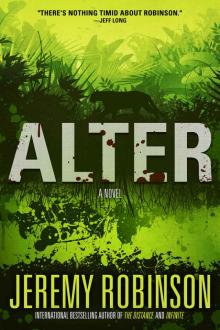 Alter
Alter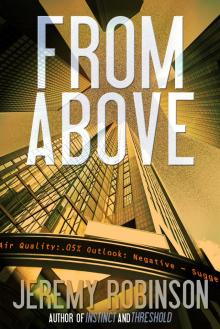 From Above - A Novella
From Above - A Novella Flux
Flux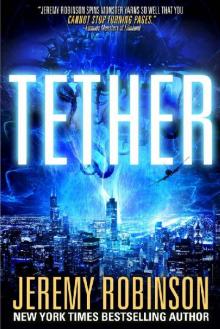 Tether
Tether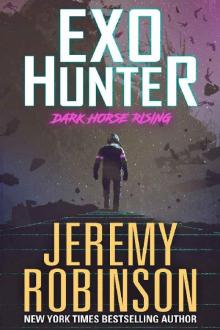 Exo-Hunter
Exo-Hunter Pulse
Pulse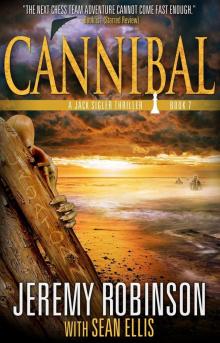 Cannibal
Cannibal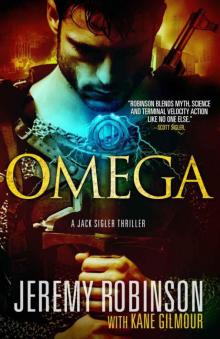 Omega: A Jack Sigler Thriller cta-5
Omega: A Jack Sigler Thriller cta-5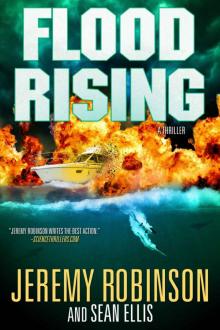 Flood Rising (A Jenna Flood Thriller)
Flood Rising (A Jenna Flood Thriller)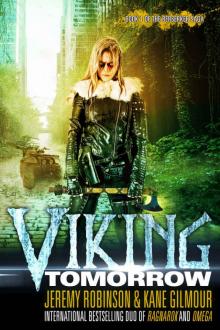 Viking Tomorrow
Viking Tomorrow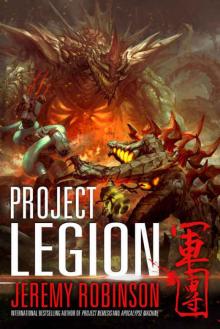 Project Legion (Nemesis Saga Book 5)
Project Legion (Nemesis Saga Book 5)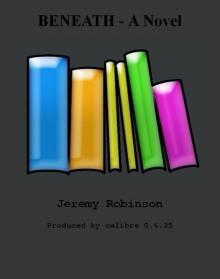 BENEATH - A Novel
BENEATH - A Novel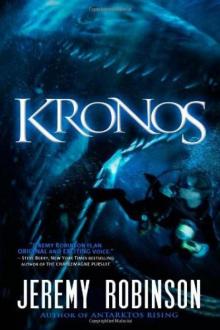 Kronos
Kronos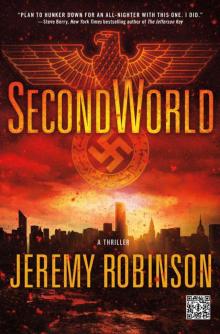 SecondWorld
SecondWorld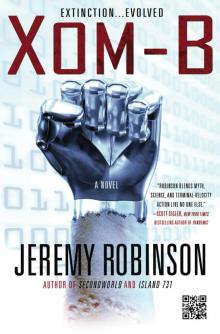 XOM-B
XOM-B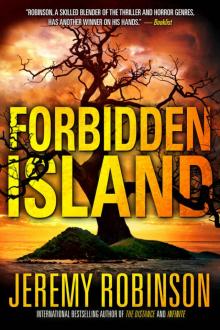 Forbidden Island
Forbidden Island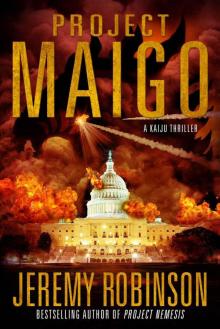 Project Maigo
Project Maigo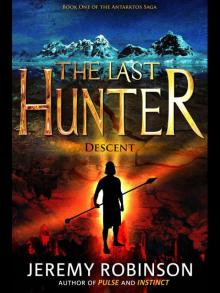 The Last Hunter - Descent (Book 1 of the Antarktos Saga)
The Last Hunter - Descent (Book 1 of the Antarktos Saga)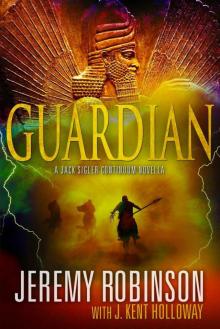 Jack Sigler Continuum 1: Guardian
Jack Sigler Continuum 1: Guardian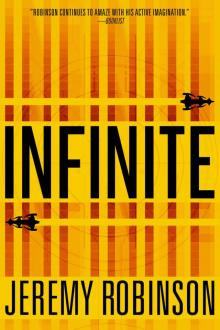 Infinite
Infinite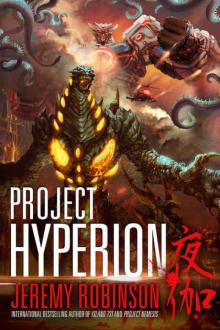 Project Hyperion
Project Hyperion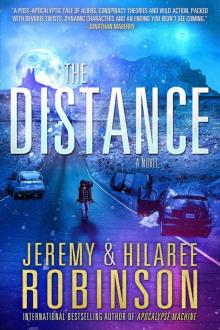 The Distance
The Distance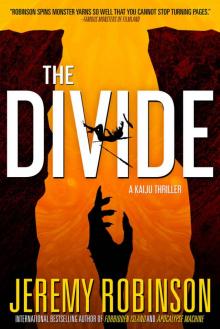 The Divide
The Divide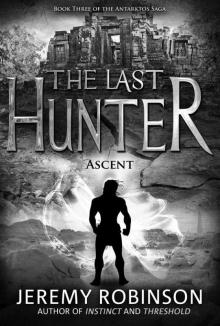 The Last Hunter - Ascent (Book 3 of the Antarktos Saga)
The Last Hunter - Ascent (Book 3 of the Antarktos Saga)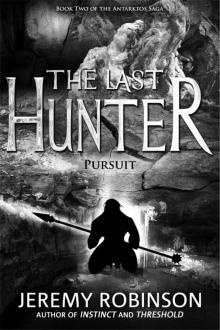 The Last Hunter - Pursuit (Book 2 of the Antarktos Saga)
The Last Hunter - Pursuit (Book 2 of the Antarktos Saga)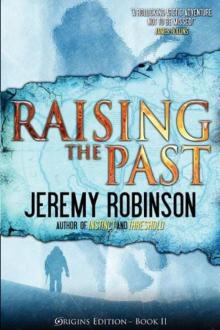 Raising the Past
Raising the Past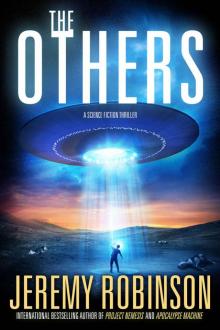 The Others
The Others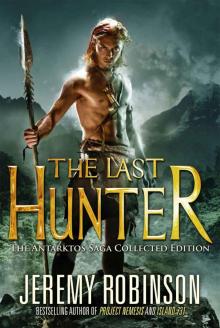 The Last Hunter - Collected Edition
The Last Hunter - Collected Edition Threshold
Threshold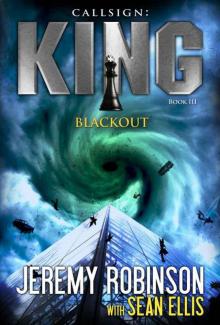 Blackout ck-3
Blackout ck-3 Antarktos Rising
Antarktos Rising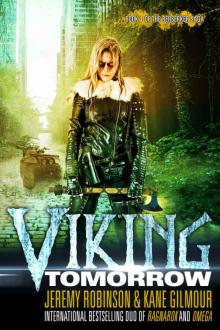 Viking Tomorrow (The Berserker Saga Book 1)
Viking Tomorrow (The Berserker Saga Book 1)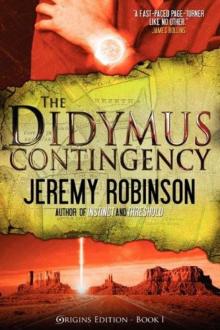 The Didymus Contingency
The Didymus Contingency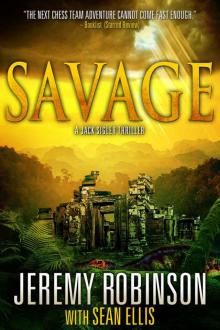 Savage (Jack Sigler / Chess Team)
Savage (Jack Sigler / Chess Team)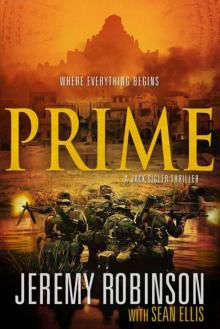 Prime
Prime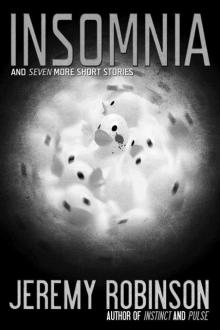 Insomnia and Seven More Short Stories
Insomnia and Seven More Short Stories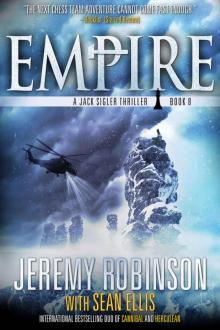 Empire (A Jack Sigler Thriller Book 8)
Empire (A Jack Sigler Thriller Book 8)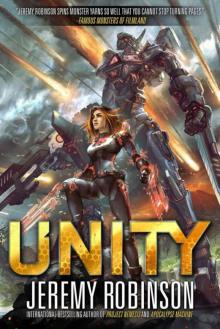 Unity
Unity Instinct
Instinct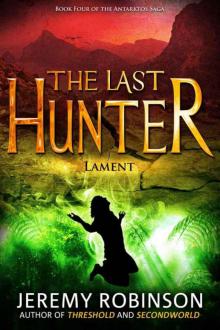 The Last Hunter - Lament (Book 4 of the Antarktos Saga)
The Last Hunter - Lament (Book 4 of the Antarktos Saga)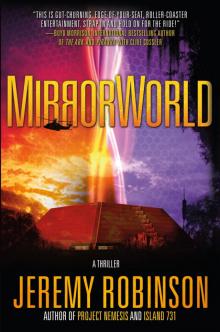 MirrorWorld
MirrorWorld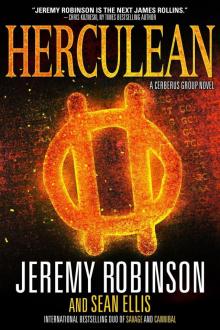 Herculean (Cerberus Group Book 1)
Herculean (Cerberus Group Book 1)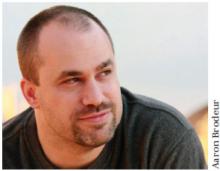 Island 731
Island 731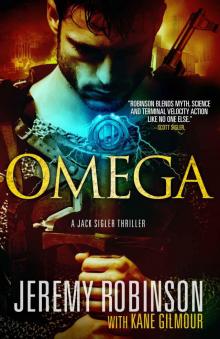 Omega: A Jack Sigler Thriller
Omega: A Jack Sigler Thriller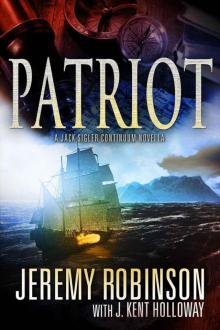 Patriot (A Jack Sigler Continuum Novella)
Patriot (A Jack Sigler Continuum Novella)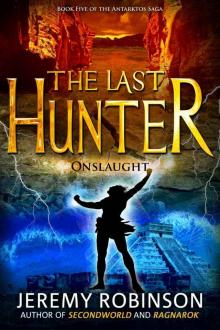 5 Onslaught
5 Onslaught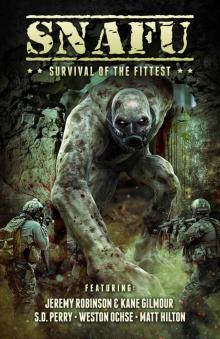 SNAFU: Survival of the Fittest
SNAFU: Survival of the Fittest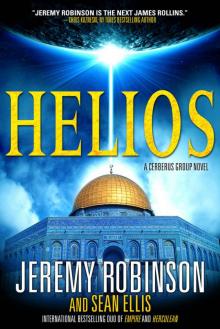 Helios (Cerberus Group Book 2)
Helios (Cerberus Group Book 2)